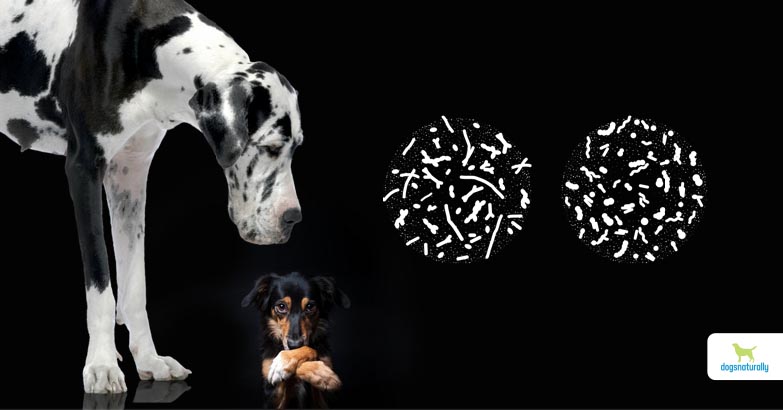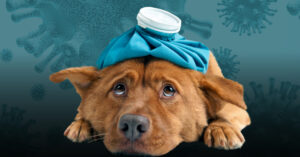Does your dog have any kind of chronic health condition? If so, a fecal transplant or Microbiome Restorative Therapy (MBRT) can provide a powerful solution.
MBRT is a fancy way of saying fecal transplants. In fecal transplants, we transplant gut microorganisms from a healthy dog to a sick one. The goal is to restore the sick dog’s gut to a healthy state.
You may be thinking “ick – that’s gross and I’d never do it to my dog.”
But wait! Don’t go away! Because research shows that fecal transplants in dogs really do heal disease. And it all starts with your dog’s microbiome …
What’s The Microbiome?
The microbiome (or microbiota) contains all the microbes that live in our bodies. That includes bacteria, viruses, bacteriophages, protozoa, and fungi.
They live on every body surface that connects to the outside world, including …
- Eyes
- Nose
- Lungs
- Bladder
- Uterus
- Gastrointestinal tract
- Skin
In humans, there are even beneficial microbes in the brain.
These microbes are generally non-pathogenic. That means they don’t cause disease. They exist in harmony with their host. And the microbes live symbiotically with the host as well … meaning the microbes and the body support each other.
The Body Has Trillions Of Microbes
The numbers are staggering. There are trillions of microbes in the human body. That’s 10 times more microbial cells than human cells … and more stars than the Milky Way. If we lined up the microbes end-to-end, they’d circle the earth 2.5 times. We have 150 times more microbes than genes! And the numbers are very similar in our canine friends.
And there are more than 10,000 different species of microbes living in and around the human body. Our dogs (who love eating and rolling in all sorts of nasty things), may have even greater diversity.
Even the inside of our cells harbors a certain kind of microbe known as mitochondria. Mitochondria are descendants of primordial bacteria. They generate most of the chemical energy that powers our cells.
To me, these statistics are awe-inspiring. They make me question everything I learned in vet school … and life!
Every Microbiome Is Unique
As individuals, we each have our own unique microbiome. It’s as personal as a fingerprint.
So … are we just a giant heap of microbes held together by cell membranes and connective tissue? And, if we’re more microbes than cells, who’s in charge? Where do our thoughts, drives, desires, and behaviors come from?
Recent discoveries about the microbiome put a whole new spin on healing. They’re causing a revolution in thinking and treating. And it’s humbling to think how little we still know.
What causes disease? Should we treat the cells and focus on their dysfunction? Or should we aim to improve the health and diversity of our microbes?
I believe that the future of medicine is in treating the microbiome.
For one thing, it’s much more accessible and manipulable than the genome. But it’s also because of its influence on the cells and the chemicals they produce to help them function.
What Disrupts The Microbiome
If the biome holds the key to health, we must examine everything that can disturb and damage it.
We know that many drugs and chemicals kill the army of supporters in and around the body. These include …
- Antibiotics
- Disinfectants
- Dewormers
- Pest preventatives (pesticides)
- Household and yard chemicals
- Environmental toxins
How do these substances affect the biome and cells? And what about the food we feed our dogs? Are we feeding the microbiome so that the microbes can feed the cells? Or are we causing malfunction with harmful diets that alter the composition of the biome?
There are still more questions than answers. But if we consider what nature intended (including dogs eating feces) … perhaps we can stop the massive destruction we’ve achieved in just a few decades.
RELATED: Feed your dog’s microbiome …
Why Gut Health Matters
About 95% of microbes live in the gut. And we can trace about 90% of diseases to the gut and an unhealthy gut biome.
The results I see from treating my animal patients’ gut biome are incredible. It makes me realize that fecal transplants for dogs are one of the most potent therapies we have. It’s the way to go … at least until we dive even further into the unknown!
Unhealthy Gut Leads To Disease
A huge number of diseases stem from a dysfunctional gastrointestinal tract. Here are a few of them …
- Allergies
- Chronic ear infections
- Autoimmune diseases
- Cancers
- Asthma
- Most inflammatory conditions
- Obesity
- Metabolic issues
- Behavioral abnormalities
RELATED: Leaky gut in dogs …
Where Microbes Come From
Your dog’s initial exposure to microbes came from her journey through the birth canal. And then from her mother’s milk. Dogs also replenish their digestive flora by eating feces.
As disgusting as it sounds, “eating shit” promotes a healthy life. Animals seem to know this instinctively.
Daisy, a very proper Poodle lady, used to be very picky about the poop she’d choose. On our walks, she paid no attention to some horse manure piles … while others were a delicacy.
Foals often eat their mother’s feces as they transition to eating more solid food. Horses with gastrointestinal (GI) issues may also dine on their pasture-mate’s poop … to try to heal their gut.
In the wild, dogs and cats first feast on the intestines of their prey. This provides large amounts of microorganisms. Dogs also enjoy a buffet of rotting carcasses to increase their intake of microbes.
What The Microbiome Does
The microbiome plays a major role in health – physical as well as mental. Here are some of the things it does.
- Manages gut development (intestinal maturation)
- Inhibits pathogens
- Digests food
- Protects the mucosal barrier (preventing leaky gut)
- Regulates hormones
- Excretes toxins
- Produces vitamins and other healing compounds
- Trains the immune system and modulates immune response
- Produces secretory IgA (immunoglobulins)
- Supports neural development
- Synthesizes neurotransmitters (the GI tract makes 90% of serotonin)
More than 80% of the body’s immune system lives in the GI tract. So it’s easy to see that GI health is paramount to the entire body.
Many studies are underway in the animal field. There’s a new journal, Animal Microbiome, that publishes emerging research.
In humans, the microbiome plays a role in autoimmune and other chronic diseases like …
- Diabetes
- Rheumatoid arthritis
- Multiple sclerosis
- Fibromyalgia
- Allergies
- Some cancers
An imbalance in the microbiome may even cause obesity.
Gut microbes play an important role in producing neurotransmitters. So a disturbance in the gut flora affects the brain. This may drive psychological disorders like depression, dementia, aggression or anxiety.
RELATED: Are dog behavior problems linked to gut health?
Fecal Transplants Aren’t New
Fecal transplants have been around since the 4th century. An ancient Chinese researcher named Ge Hong used what he called yellow soup to treat his patients with severe diarrhea. German physicians wrote a stool recipe book about treating GI illnesses.
But in modern medicine, fecal transplantation in humans is in its infancy. It’s currently only FDA-approved for Clostridium difficile infections.
Fortunately, veterinary medicine is much more advanced. More and more veterinarians are using MBRT in their practices. There are different ways to perform fecal transplants in dogs … including both rectal and oral methods.
And, as I noted earlier, some dogs do their own “transplants” when they eat poop. You might not have realized it was so good for them! Your four-legged companion may have already prepared you for this disgusting idea.
The Transplant Recipient
The transplantation process is very simple (as you’ll see in the video below). But, for the best results, you need to do some preparation.
When you implant a healthy biome into a hostile environment, it’s harder for it to survive. So it’s best to decrease inflammation in the gut beforehand.
In my practice, we do this by:
- Testing for food sensitivities.
- Eliminating pro-inflammatory foods … meaning no processed foods with poor quality ingredients and high levels of carbohydrates.
- Adding probiotics, digestive enzymes plus an immune support product. These supplements strengthen the tight junctions in the gut lining. This promotes better communication between microorganisms.
Finding A Donor Dog
Finding a healthy dog to be a fecal donor can be tricky. There are several important criteria for donors:
- Excellent health.
- Free from chemical exposure (as much as possible).
- Preferably not de-sexed.
- Raised on a raw diet (donor and ancestors).
- Long-lived with much exposure to nature (again, donor and ancestors).
- A happy disposition.
- No antibiotics, non-steroidal anti-inflammatory drugs or other microbiome-damaging chemicals … any time in their lives.
The donor dog must pass an array of tests to verify health. This helps avoid transferring unwanted pathogens.
RELATED: Which probiotics work best for dogs …
Who Can Benefit?
In my practice, almost every dog gets a fecal transplant even if they don’t have any obvious signs of disease. Most animals I see have had antibiotics or other compromising drugs at some point in their lives.
Symptoms and diseases that MBRT can help are:
- Gastrointestinal disturbances
- Neurological issues
- Hypothyroidism
- Aggression
- Anxiety
- Skin conditions
- Various types of cancers
- Lyme disease and other infections
- Kidney and liver issues
- Chronic ear infections
We’re still discovering the far-reaching effects of our friendly microbe cohabitants. There’s infinite potential for improvement in many other conditions as well.
This video shows one of my patients getting a fecal transplant.
Two Case Histories
These two case histories show how giving your dog a fecal transplant can resolve stubborn problems.
#1 Bear’s IBD
Bear is a German Shepherd with longstanding inflammatory bowel disease (IBD). He was a police dog … but his health issues and high anxiety prevented him from doing his job.
I met him after he’d gone through a battery of tests and treatments. He’d had food sensitivity testing and switched to a raw diet.
Despite all these efforts his gut health was still suffering. But with poop to the rescue, he had normal stool a few days after his fecal transplant.
His family sent me this joyful email a couple of days after the procedure: “Bear’s poop is formed and soft. Color is improving. All he wants to do is play! His energy level is off the charts!”
Bear’s fecal quality continued to improve to become normal.
#2 Hudson’s Skin Disease
Hudson is a middle-aged Labrador Retriever. He’d suffered from skin allergies and recurring ear infections his entire life.
When I met him he was already on a raw diet. His owners had tried many different therapies. At that time his skin was out of control. Hudson’s quality of life was seriously compromised.
He did get some medication at first, to keep him comfortable. Then we tested for food sensitivities and eliminated the foods he was sensitive to. We prepared his gut with the usual protocol … then he received a fecal transplant.
Since the transplant, he’s completely changed in appearance. He’s regained his joy for life and mischief! A repeat transplant quickly resolved a brief flare-up this spring.
References
Chaitman J, Gaschen F. Fecal microbiota transplantation in dogs. Vet Clin North Am Small Anim Pract. 2021 Jan;51(1):219-233.
Redfern A, Suchodolski J, Jergens A. Role of the gastrointestinal microbiota in small animal health and disease. Vet Rec. 2017 Oct 7;181(14):370.
Blake AB et al. Altered microbiota, fecal lactate, and fecal bile acids in dogs with gastrointestinal disease. PLoS One. 2019 Oct 31;14(10):e0224454.
Wernimont SM et al. The effects of nutrition on the gastrointestinal microbiome of cats and dogs: Impact on health and disease. Front Microbiol. 2020 Jun 25;11:1266.
Poling HMet al. Mechanically induced development and maturation of human intestinal organoids in vivo. Nat Biomed Eng. 2018 Jun;2(6):429-442.
Warner BB. The contribution of the gut microbiome to neurodevelopment and neuropsychiatric disorders. Pediatr Res. 2019 Jan;85(2):216-224.
Ma, Q., Xing, C., Long, W. et al. Impact of microbiota on central nervous system and neurological diseases: the gut-brain axis. J Neuroinflammation. 2019;16:53.
Chaitman Jet al. Fecal microbial and metabolic profiles in dogs with acute diarrhea receiving either fecal microbiota transplantation or oral metronidazole. Front Vet Sci. 2020 Apr 16;7:192.
Pereira GQ, et al. Fecal microbiota transplantation in puppies with canine parvovirus infection. J Vet Intern Med. 2018 Mar;32(2):707-711.













